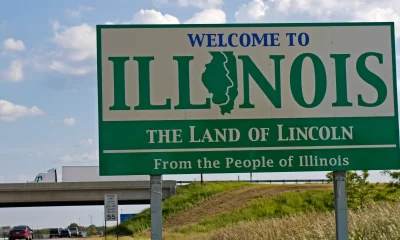Government
With Fate of Ballot Initiative Up in the Air, Poll Finds Majority of Missouri Voters Back Legalization

According to a new poll conducted by SurveyUSA, more than 60% of voters in Missouri believe that cannabis should be legal.
It is still unclear whether a proposal to legalize cannabis use for adults will qualify for this year’s ballot in Missouri. But if it does, it’s a good bet to pass.
That is the takeaway of a new poll conducted and released late last month.
Sixty-two percent of Missouri voters said they believe marijuana for recreational use should be legal, according to the latest findings from SurveyUSA. Only 26% of those polled said that weed should remain illegal.
Huge majorities of Democrats and independents in the Show Me State support the end of cannabis prohibition, the survey found.
Seventy-eight percent of Dems said that recreational pot use should be legal, while 68% of Missouri independents said the same.
Republicans in the state were more divided on the question, with 47% of GOP voters in Missouri saying that recreational cannabis use should be legal and 40% saying it should remain illegal.
Huge majorities in every age group said they support legalization—except for those 65 and older.
Seventy-three percent of voters aged 18-34 said they are in favor of ending prohibition, while 70% of the 35-49 age group and 60% of those aged 50-64 said the same.
Among voters 65 and older, the split was identical to the divide among Republicans: 47% said they support legalization, while 40% said they do not.
The SurveyUSA poll was conducted July 24-27 and is based on interviews with 1,981 registered Missouri voters. It has a margin of error of 2.6%.
All told, the polling data is highly encouraging to advocates who are hoping that Missouri becomes the latest state to legalize recreational pot use this year.
But first, they must get the question before voters in the state.
That remains up in the air, as the Missouri secretary of state’s office continues to assess petitions submitted by a group aiming to get a legalization initiative on this year’s ballot.
Missouri Secretary of State Jay Ashcroft said last month that it is too early to say whether organizers gathered the required number of signatures in order for an initiative to qualify.
Under Missouri state law, organizers must obtain signatures from 8% of registered voters in six of the eight congressional districts.
In May, the group Legal Missouri 2022 submitted more than 385,000 signatures to Ashcroft’s office, well above the requisite threshold.
But local television station KFVS reported last month that, although the group had obtained the required number signatures in four congressional districts, the counts in the other four districts were less than certain.
Ashcroft’s office is expected to make a final decision on the initiative by August 9.
“I can’t say without any certainty whether it will make it or not. It is in no way certain that they will fail. This isn’t dead,” Ashcroft told the St. Louis Post-Dispatch.
Organizers affiliated with Legal Missouri, meanwhile, continue to express optimism that voters will have an opportunity to weigh in on the initiative come November.
“The Legal Missouri 2022 campaign continues to work to ensure that every valid voter signature is counted properly, and is excited that Missouri voters will soon have their opportunity to decide for themselves,” the group’s campaign manager, John Payne, told the St. Louis Post-Dispatch last month.
“Our close review of voter signature totals submitted to the state by counties shows that we have more than enough signatures to qualify our citizens’ initiative for the November general election ballot — and that some counties, due to a reliance on temporary workers, mistakenly rejected thousands of valid voter signatures. To be clear, this is not to suggest or imply any wrongdoing on the part of counties,” Payne added.
Business
New Mexico cannabis operator fined, loses license for alleged BioTrack fraud

New Mexico regulators fined a cannabis operator nearly $300,000 and revoked its license after the company allegedly created fake reports in the state’s traceability software.
The New Mexico Cannabis Control Division (CCD) accused marijuana manufacturer and retailer Golden Roots of 11 violations, according to Albuquerque Business First.
Golden Roots operates the The Cannabis Revolution Dispensary.
The majority of the violations are related to the Albuquerque company’s improper use of BioTrack, which has been New Mexico’s track-and-trace vendor since 2015.
The CCD alleges Golden Roots reported marijuana production only two months after it had received its vertically integrated license, according to Albuquerque Business First.
Because cannabis takes longer than two months to be cultivated, the CCD was suspicious of the report.
After inspecting the company’s premises, the CCD alleged Golden Roots reported cultivation, transportation and sales in BioTrack but wasn’t able to provide officers who inspected the site evidence that the operator was cultivating cannabis.
In April, the CCD revoked Golden Roots’ license and issued a $10,000 fine, according to the news outlet.
The company requested a hearing, which the regulator scheduled for Sept. 1.
At the hearing, the CCD testified that the company’s dried-cannabis weights in BioTrack were suspicious because they didn’t seem to accurately reflect how much weight marijuana loses as it dries.
Company employees also poorly accounted for why they were making adjustments in the system of up to 24 pounds of cannabis, making comments such as “bad” or “mistake” in the software, Albuquerque Business First reported.
Golden Roots was fined $298,972.05 – the amount regulators allege the company made selling products that weren’t properly accounted for in BioTrack.
The CCD has been cracking down on cannabis operators accused of selling products procured from out-of-state or not grown legally:
- Regulators alleged in August that Albuquerque dispensary Sawmill Sweet Leaf sold out-of-state products and didn’t have a license for extraction.
- Paradise Exotics Distro lost its license in July after regulators alleged the company sold products made in California.
Golden Roots was the first alleged rulebreaker in New Mexico to be asked to pay a large fine.
Source: https://mjbizdaily.com/new-mexico-cannabis-operator-fined-loses-license-for-alleged-biotrack-fraud/
Business
Marijuana companies suing US attorney general in federal prohibition challenge

Four marijuana companies, including a multistate operator, have filed a lawsuit against U.S. Attorney General Merrick Garland in which they allege the federal MJ prohibition under the Controlled Substances Act is no longer constitutional.
According to the complaint, filed Thursday in U.S. District Court in Massachusetts, retailer Canna Provisions, Treevit delivery service CEO Gyasi Sellers, cultivator Wiseacre Farm and MSO Verano Holdings Corp. are all harmed by “the federal government’s unconstitutional ban on cultivating, manufacturing, distributing, or possessing intrastate marijuana.”
Verano is headquartered in Chicago but has operations in Massachusetts; the other three operators are based in Massachusetts.
The lawsuit seeks a ruling that the “Controlled Substances Act is unconstitutional as applied to the intrastate cultivation, manufacture, possession, and distribution of marijuana pursuant to state law.”
The companies want the case to go before the U.S. Supreme Court.
They hired prominent law firm Boies Schiller Flexner to represent them.
The New York-based firm’s principal is David Boies, whose former clients include Microsoft, former presidential candidate Al Gore and Elizabeth Holmes’ disgraced startup Theranos.
Similar challenges to the federal Controlled Substances Act (CSA) have failed.
One such challenge led to a landmark Supreme Court decision in 2005.
In Gonzalez vs. Raich, the highest court in the United States ruled in a 6-3 decision that the commerce clause of the U.S. Constitution gave Congress the power to outlaw marijuana federally, even though state laws allow the cultivation and sale of cannabis.
In the 18 years since that ruling, 23 states and the District of Columbia have legalized adult-use marijuana and the federal government has allowed a multibillion-dollar cannabis industry to thrive.
Since both Congress and the U.S. Department of Justice, currently headed by Garland, have declined to intervene in state-licensed marijuana markets, the key facts that led to the Supreme Court’s 2005 ruling “no longer apply,” Boies said in a statement Thursday.
“The Supreme Court has since made clear that the federal government lacks the authority to regulate purely intrastate commerce,” Boies said.
“Moreover, the facts on which those precedents are based are no longer true.”
Verano President Darren Weiss said in a statement the company is “prepared to bring this case all the way to the Supreme Court in order to align federal law with how Congress has acted for years.”
While the Biden administration’s push to reschedule marijuana would help solve marijuana operators’ federal tax woes, neither rescheduling nor modest Congressional reforms such as the SAFER Banking Act “solve the fundamental issue,” Weiss added.
“The application of the CSA to lawful state-run cannabis business is an unconstitutional overreach on state sovereignty that has led to decades of harm, failed businesses, lost jobs, and unsafe working conditions.”
Business
Alabama to make another attempt Dec. 1 to award medical cannabis licenses

Alabama regulators are targeting Dec. 1 to award the first batch of medical cannabis business licenses after the agency’s first two attempts were scrapped because of scoring errors and litigation.
The first licenses will be awarded to individual cultivators, delivery providers, processors, dispensaries and state testing labs, according to the Alabama Medical Cannabis Commission (AMCC).
Then, on Dec. 12, the AMCC will award licenses for vertically integrated operations, a designation set primarily for multistate operators.
Licenses are expected to be handed out 28 days after they have been awarded, so MMJ production could begin in early January, according to the Alabama Daily News.
That means MMJ products could be available for patients around early March, an AMCC spokesperson told the media outlet.
Regulators initially awarded 21 business licenses in June, only to void them after applicants alleged inconsistencies with how the applications were scored.
Then, in August, the state awarded 24 different licenses – 19 went to June recipients – only to reverse themselves again and scratch those licenses after spurned applicants filed lawsuits.
A state judge dismissed a lawsuit filed by Chicago-based MSO Verano Holdings Corp., but another lawsuit is pending.
Source: https://mjbizdaily.com/alabama-plans-to-award-medical-cannabis-licenses-dec-1/
-

 Business2 years ago
Business2 years agoPot Odor Does Not Justify Probable Cause for Vehicle Searches, Minnesota Court Affirms
-

 Business2 years ago
Business2 years agoNew Mexico cannabis operator fined, loses license for alleged BioTrack fraud
-

 Business2 years ago
Business2 years agoAlabama to make another attempt Dec. 1 to award medical cannabis licenses
-

 Business2 years ago
Business2 years agoWashington State Pays Out $9.4 Million in Refunds Relating to Drug Convictions
-

 Business2 years ago
Business2 years agoMarijuana companies suing US attorney general in federal prohibition challenge
-

 Business2 years ago
Business2 years agoLegal Marijuana Handed A Nothing Burger From NY State
-

 Business2 years ago
Business2 years agoCan Cannabis Help Seasonal Depression
-

 Blogs2 years ago
Blogs2 years agoCannabis Art Is Flourishing On Etsy













